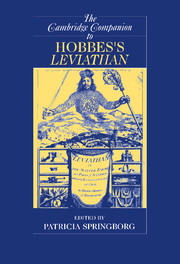Book contents
- Frontmatter
- General Introduction
- Part I: Of Man
- Part II: Of Commonwealth
- Part III: Of a Christian Commonwealth
- Part IV: Of the Kingdom of Darkness
- Part V: Hobbes’s Reception
- 18 Hobbes and His Contemporaries
- 19 The Reception of Hobbes’s Leviathan
- 20 Clarendon against Leviathan
- 21 Silencing Thomas Hobbes: The Presbyterians and Leviathan
- Bibliography
- Index
- Series List
21 - Silencing Thomas Hobbes: The Presbyterians and Leviathan
from Part V: - Hobbes’s Reception
Published online by Cambridge University Press: 28 November 2007
- Frontmatter
- General Introduction
- Part I: Of Man
- Part II: Of Commonwealth
- Part III: Of a Christian Commonwealth
- Part IV: Of the Kingdom of Darkness
- Part V: Hobbes’s Reception
- 18 Hobbes and His Contemporaries
- 19 The Reception of Hobbes’s Leviathan
- 20 Clarendon against Leviathan
- 21 Silencing Thomas Hobbes: The Presbyterians and Leviathan
- Bibliography
- Index
- Series List
Summary
From its initial publication, and for centuries thereafter, Hobbes's Leviathan was a notorious book. Censors regularly targeted it and would eventually secure a decades-long ban on its vernacular publication in England. Its infamy prevented Hobbes from publishing on religion or politics after 1660 and cast a shadow of suspicion over his other existing works. The present chapter will examine the earliest efforts to secure the suppression of Leviathan. This censorship campaign occurred soon after the work's appearance and, though unsuccessful in its immediate purpose, was determined and extensive. The details of this censorship campaign throw considerable light on Leviathan's reception among its initial readers, before its reputation for atheism and heresy had fully hardened.
Among Hobbes specialists, the history of the censorship of his major works has been an orphaned subject. To be sure, the general prohibition on Hobbes's political and religious writings that prevailed after the Restoration is ubiquitously acknowledged. But this is typically treated as a natural corollary of Hobbes's general infamy among contemporaries. Historians have made little effort to detail the precise campaigns and factions that tried to gag the author of Leviathan, other than to note (correctly but imprecisely) that such efforts were usually directed by clergymen. The explanation for this lacuna, it might be suggested, is two-fold. First, scholars long treated clerical opposition to Thomas Hobbes as unproblematic.
- Type
- Chapter
- Information
- The Cambridge Companion to Hobbes's Leviathan , pp. 478 - 500Publisher: Cambridge University PressPrint publication year: 2007
- 2
- Cited by



